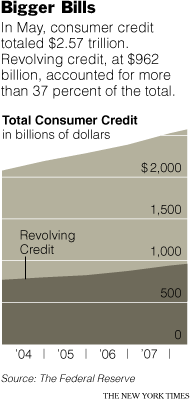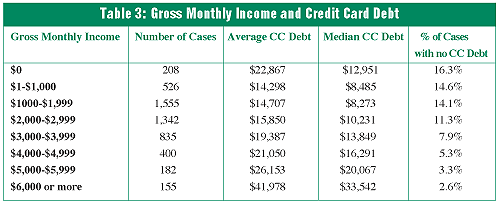Credit Card Debt Obsession: Americans Unwilling to Give up Plastic. Bankruptcies and the Credit Card Addiction.
- 2 Comment
The banking crisis with mortgages at the center, has taken much of the economic headline news over the past two years. Yet there is a brewing problem in the credit card markets. Credit card debt is now becoming another bubble itching to burst. The meteoric rise in bankruptcies is simply a reflection that Americans have maxed out in every form of debt.
Mortgage debt, auto debt, and consumer debt through credit cards. With $962 billion in revolving debt, Americans are anything but shy to use the credit card:
Source:Â New York Times
There is a philosophy regarding useful life strategies of debt. The major one that tends to be the most prudent (rarely used) is never taking a loan that is longer than the functional use of the item being financed. That is, a car might have a 5 year timeline before major repairs and therefore, a loan any longer would simply make little economic sense. A home with a 30 year mortgage is a perfect example. Most Americans will be using the car and the home for a very long time deriving a utility as time goes by. But with credit cards, the most insidious kind of usage occurs. Some Americans go out and spend $100 on one meal and charge it. They pile on a few of these meals over the month, and then pay monthly minimums. This defeats the utility purpose of debt. For example, the meal is a one and done occurrence. It isn’t intended to be a financed asset. Or a vacation. Many Americans financed elaborate vacations during the credit boom days on credit cards and many are still paying years later for a two week vacations that occurred long ago.
This is why we are now in an era of forced austerity. Imagine someone in a third world country taking a two week vacation to Fiji. It just doesn’t happen. So why should someone that is broke in the U.S. be able to do this? It is because of our triple-A rating which was abused. Credit card companies just like mortgage backed security markets were in the midst of the greatest debt bubble in history. They found an insatiable appetite on the global markets for debt. Any kind of debt really. All you needed to do this decade was to look at the excess waste that was occurring to see that this was going to end in a massive contraction in wealth. And it did. Even though the stock market is in the midst of one of the strongest bear market rallies in history, the American consumer is being hit from every corner. Think for a second. How is 25,000,000 Americans unemployed or underemployed good for a consumption based economy? It isn’t. And think of the two biggest purchases, a home and a car. All of a sudden, those industries are dropping because Americans now have to rely on income to justify purchases.
Credit card companies are now withdrawing an enormous amounts of credit from the market. This isn’t necessarily bad. Yet many Americans have been relying on credit cards as their own lender of last resort. Whether this was a smart move I’ll leave up to you but families facing contracting wages and job losses logically used whatever means they had at their disposal. Easy access to credit was a lifeline.
Yet the massive amount of revolving debt is now seeing enormous cracks. Take a look at some older data regarding Chapter 7 cases:
The chart you are looking at is a sample from a group of Chapter 7 “no-asset” bankruptcies. This data is astounding. First, look at the gross monthly income line. We have 208 cases were zero monthly income is reported with an average credit card debt of $12,951! With zero dollars coming in can you see how this is a problem? Plus, you will also see that a higher income does not mean you are safe. We have 155 cases of gross monthly incomes of $6,000 where the average credit card debt was $41,978. Now of course the above data only focuses on credit card debt. Given the massive debt bubble, we can safely assume that many of these cases also included auto and mortgage debt.
We always hear about medical debt being a major issue for bankruptcies. Make no mistake, it is. But in the above sample from the Department of Justice Report approximately half reported no medical debt. In no time in our history have people had access to so much debt with no checks and balances. The market is correcting this forcibly. That is the irony with the banks holding on to so much excess reserves. There is no paradox about this. The fact that they now have to check for incomes and reality has practically shut the market down. If you walk into a bank with good credit and money down, you can get a mortgage or an auto loan with a historically low rate. But Americans are not because they are finally realizing that debt does not equal wealth and are concerned about their jobs. Simply having access to debt does not make you rich. This notion is being cracked on many levels.
We aren’t the only ones addicted to credit cards. The United Kingdom has 64.7 billion pounds of credit card debt. Australia has $41 billion (AUD) in credit card debt. So as countries we love our credit cards but they are now coming back to haunt people. I had an experience with this. I took out a 0 percent card and moved a balance over. I had an automatic bill that I had forgotten and all of a sudden that 0 percent went to 15.99 percent. Thankfully, I had enough to pay it off but I just think about how many people are getting reamed this way? A simple error and now they are beholden to the credit card company. That is why if you cannot pay off your balance each month, you probably should resort to using your debit card. For many people credit cards are an addiction. They can’t stop spending on them. Yet our current economic situation requires you to be prudent and put the plastic away. Credit cards are not a means of getting rich. If anything, they can put you in the poor house quickly.
If you enjoyed this post click here to subscribe to a complete feed and stay up to date with today’s challenging market!2 Comments on this post
Trackbacks
-
TheCynicalEconomist said:
“Mortgage debt, auto debt, and consumer debt through credit cards. With $962 ****trillion*** in revolving debt, Americans are anything but shy to use the credit card”
Change trillion to billion
I know just stupid typo…
I do those on my site tooJune 4th, 2009 at 3:52 pm -
David said:
For too many families now a credit card is the only way that financially they can meet basic needs. They have lost their house, lost their job (both husband and wife) and cannot qualify for government assistance because they have made too much in wages the past year. So they use what is left and that is their credit limit to buy food and gas to search for another job which will not pay as much as the one they lost. What are they to do? All that said we as Americans need to quit the credit card addiction and do what we expect our local governments to do. Operate on a budget! It means giving up alot of things a relearning fiscal responsibility. It has been a hard lesson for me but I am learning. One last item, without good paying jobs for our citizens getting off the credit card merry-go-round will be impossible because income won’t rise sufficiently to allow paying off balances and meeting monthly needs.
June 5th, 2009 at 10:59 am


 If you enjoyed this post click here to subscribe to a complete feed and stay up to date with today’s challenging market!
If you enjoyed this post click here to subscribe to a complete feed and stay up to date with today’s challenging market!